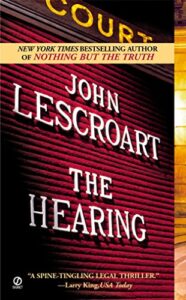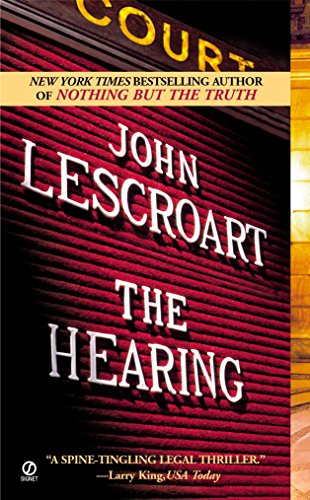
Watch the video review
The Hearing, by John Lescroart, was published in 2002. It is the seventh book in the Dismas Hardy series of legal thrillers. There are now 19 books in the overall series, which continues until today, Why am I reviewing a 21-year-old book? It was sitting on a “take me” shelf at a hotel where I was staying. Your book hound is always looking for low- or no-cost books to review, so here we are.
The Hearing begins with San Francisco PD homicide lieutenant Abe Glitzky’s phone ringing in the middle of the night. Police have come across a woman shot to death, with a junkie hovering over her taking her jewelry. The suspect runs, but they catch him with the gun in his hand.
The victim, Elaine Wager, is not just anyone. She’s the African American daughter of a late US Senator. Once a prosecutor, she’s now a partner at a major San Francisco law firm. She’s also Abe Glitzky’s daughter, though no one knows that.
Glitzky arrives at the scene and proceeds to deny the suspect, Cole, any kind of treatment for heroin detox, which is a questionable tactic for the police, and his men are nervous about following his order. They’re also puzzled why their lieutenant is taking such a risky approach to what seems like an open and shut case. The cops take Cole to the station and sweat him for hours, getting him to confess, at least, that he might have shot Wager, but he can’t remember. He was drunk and high.
Sharron Pratt, the San Francisco District Attorney, trying to jump start her reelection campaign and overcome a perception that she’s soft on crime, announces that she’s going to go for the death penalty in the Elaine Wager case.
Dismas Hardy, criminal defense attorney, is approached by Cole’s sister, who is a friend of his. Her brother needs a defense attorney. Can he help? He’s not very interested. It looks like he’s guilty, and there isn’t much that anyone can do for him. However, as a courtesy, he agrees to handle Cole’s arraignment and a few other matters.
However, what seems to be so open and shut on the surface quickly reveals itself to be great deal more complicated. Glitzky is not so sure the confession is legitimate. Something feels off about the whole crime scene. Not that it matters. Cole appears to be guilty as hell. They have him at the scene, with the gun, with gunpowder on his hands, with the victim’s jewelry in his pockets. He confessed. It looks like he’s going to fry.
Meanwhile, Glitzky shows Hardy, his best friend, the confession tape. This is not the way things work, and Glitzky ends up getting suspended from his job. He has to pursue a parallel investigation. He goes to interview Treya, Wager’s paralegal, and finds her seething with hostility… She’s totally uncooperative, and when Glitzky finds out why–because she knows that Glitzky was Wager’s father but never acknowledged her—he promptly has a massive heart attack and collapses on the street.
This is a long version of “meeting cute,” and Glitzky, a widower, is soon smitten with Treya. Romance is in the wind, as are many kitchen sinks’ worth of suspicious clues and dubious goings on at the DA’s office and with several unsavory characters in San Francisco’s legal world.
The story builds up the preliminary hearing, the “hearing” of the title. Hardy is going into the hearing with his d@# in his hand, so to speak. He basically has nothing except some compelling guesswork and suspicious coincidences. The judge isn’t a fan of Hardy’s, to start with, and blasts him icily in chambers before the hearing, warning him not to act up or he’ll be held in contempt.
As the hearing unfolds, Hardy probes and cajoles witnesses to lead him in a direction that he hopes will exonerate Cole. Or, at least, he hopes to get the DA to drop the “special” homicide charge that leads to the death penalty. I’m no lawyer, but this sounds like a very risky strategy. He’s blundering around, hoping for a breakthrough as the judge glares at him and curiously allows speculation after speculation to stand.
The Hearing is an effective legal thriller. Lescroart knows his way around this kind of material very well. The details and play-by-play machinations of all the parties are fascinating. He holds your suspense, for the most part. My only complaint about this book is that it’s way too long. Clocking in at 540 pages, it’s double the length it ought to be. At certain points, I wasn’t sure if I was going to stick it out, but I wanted to see how it ended.
